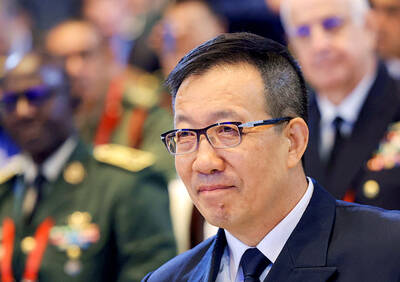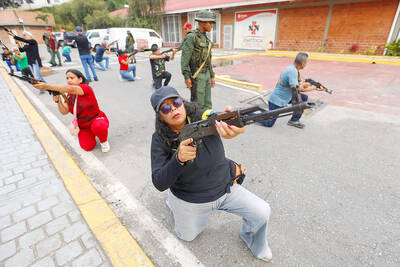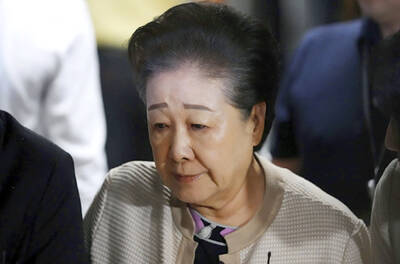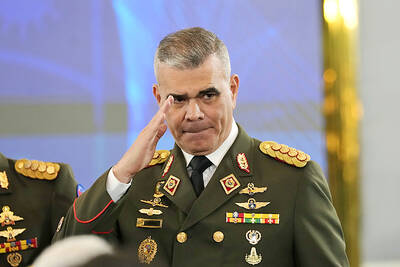One of North Korean leader Kim Jong-il's closest confidants died at the weekend, state media reported yesterday, with analysts saying his death could signal changes in the regime's internal power structure.
Yon Hyong-muk died on Saturday at the age of 73 of an "incurable disease," Pyongyang's official Korean Central News Agency (KCNA) said.
Yon, a Czech-educated technocrat, had served as vice chairman of the powerful National Defense Commission led by Kim since 2003, according to the agency monitored in Seoul.
"Though having no major impact on the North's external policy, it may bring a change to the North's internal power structure," said Koh Yu-hwan, a North Korea expert and professor at Dongguk University in Seoul.
"As close aides to Kim Jong-il are dying of disease and age or in accidents, a generation change by young North Korean elites to the leadership could come earlier than expected," he said.
KCNA did not name the disease from which Yon, also a former prime minister, suffered. Seoul's Yonhap news wire service said he had surgery in Russia last year for treatment of pancreatic cancer.
North Korea experts in Seoul said Yon's death highlighted how vulnerable Pyongyang's aging leadership was to illness and old age and reaffirmed the need for generational change.
KCNA, describing Yon's death as "a big loss to [the Korean Workers' Party] and [the Korean] people," said that a state funeral would be held for him.
Yon had been regarded as one of Kim's closest aides, accompanying the reclusive supremo to key public events, including the 2000 inter-Korean peace summit, according to knowledgable North Korea watchers.
Yon had long been involved in the North's defense industry as heavy industry minister, and in the development of Pyongyang's foreign policy as a communist party secretary.

BEIJING FORUM: ‘So-called freedom of navigation advocated by certain countries outside the region challenges the norms of international relations,’ the minister said Chinese Minister of National Defense Dong Jun (董軍) yesterday denounced “hegemonic logic and acts of bullying” during remarks at a Beijing forum that were full of thinly veiled references to the US. Organizers said that about 1,800 representatives from 100 countries, including political, military and academic leaders, were in Beijing for the Xiangshan Forum. The three-day event comes as China presents itself as a mediator of fraught global issues including the wars in Ukraine and Gaza. Addressing attendees at the opening ceremony, Dong warned of “new threats and challenges” now facing world peace. “While the themes of the times — peace and development —

Venezuela on Saturday organized a day of military training for civilians in response to the US deployment in the Caribbean, and amid new threats from US President Donald Trump. About a month ago, Washington deployed warships to international waters off Venezuela’s coast, backed by F-35 jets sent to Puerto Rico in what it calls an anti-drug and anti-terrorism operation. Venezuelan Minister of Defense Vladimir Padrino Lopez has accused Washington of waging “undeclared war” in the Caribbean, after US strikes killed over a dozen alleged drug traffickers off his country’s coast. Caracas also accused the US of seeking regime change, and

BRIBERY ALLEGATIONS: A prosecutor said they considered the risk of Hak-ja Han tampering with evidence to be very high, which led them to seek the warrant South Korean prosecutors yesterday requested an arrest warrant for the leader of the Unification Church, Hak-ja Han, on allegations of bribery linked to the country’s former first lady and incitement to destroy evidence. The move came a day after the 82-year-old was questioned over her alleged role in bribing former first lady Kim Keon-hee and a lawmaker. Founded in 1954 by her late husband, Sun Myung Moon, the Unification Church has long been the subject of controversy and criticism, with its teachings centered on Moon’s role as the “second coming” and its mass weddings. Followers are derisively referred to as “Moonies.” However, the church’s

‘MURDER’: The US has not provided proof that boats it has struck were trafficking drugs, and a Venezuelan official said it was a crime against humanity that must be investigated Venezuela on Friday accused the US of waging an “undeclared war” in the Caribbean and called for a UN probe of US strikes that have killed more than a dozen alleged drug traffickers on boats over the past few weeks. Washington has deployed warships to international waters off Venezuela’s coast, backed by F-35s sent to Puerto Rico in what it calls an anti-drug operation. “It is an undeclared war, and you can already see how people, whether or not they are drug traffickers, have been executed in the Caribbean Sea. Executed without the right to a defense,” Venezuelan Minister of Defense Vladimir